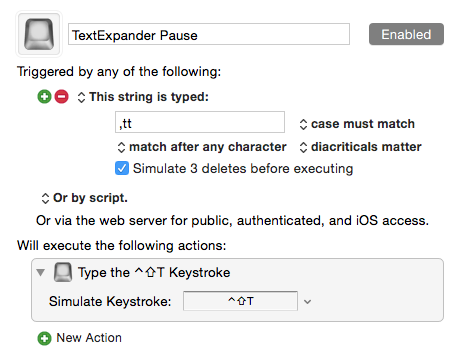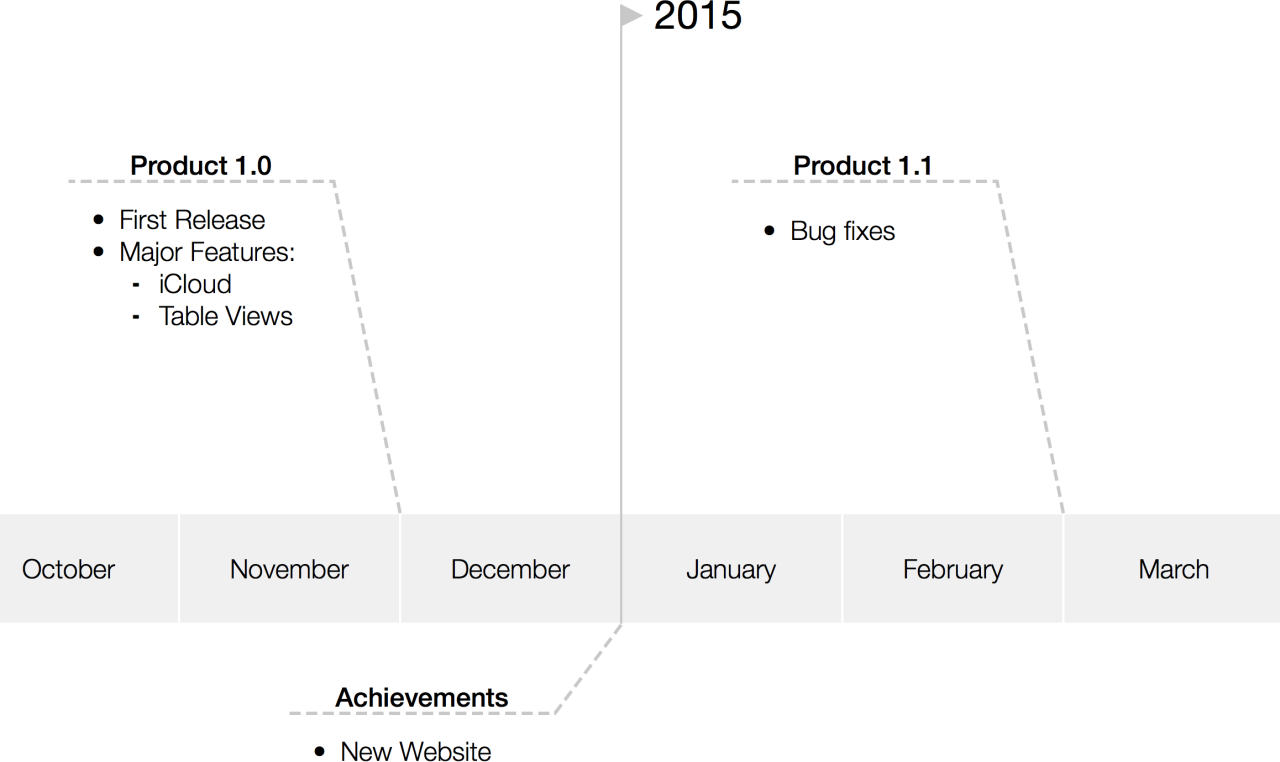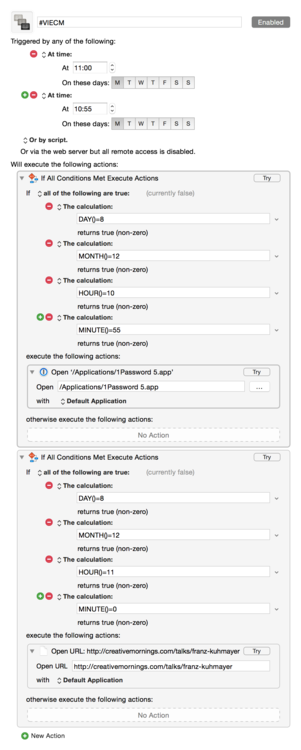12/16/2014 17:30:00
¶
●
My Workflow App Workflows: Share, Affiliate Links, Clean Link
Geeks, rejoice! We have a new nerdy tool to play with on iOS. Its name is Workflow, and it’s really cool. Essentially it’s Automator for iOS.
The good thing about Workflow? Even I can work with x-callback URL’s now.
What do I use the app for? I’m glad you asked.
Share
Based on Vic Hudson’s excellent Workflow to tweet the most recent podcast from Overcast, I built a similar sharing workflow that allows to tweet/post/share any page.
The cool thing about his workflow was/is that it gets the podcast image and attaches it to a tweet, along with the URL and the title of the episode. Kind of neat.
Since I don’t use Overcast, though, it had certain downsides for me. Plus I thought it would be neat if the workflow was able to share any URL. So I came up with this workflow. It takes any URL to download a pages’ title, then it grabs all the images off a webpage, and displays them in Quick Look. Memorize the index (the number) of the image, then tap done. The choose from list dialog comes up. Tap the row that corresponds to the index in Quick Look. First image is first row, second image is second row, etc.
The workflow will take all that stuff and bring up the standard share sheet. This way you can share the attached image as tweet, Facebook post, iMessage, or email. Pretty cool, right?
Here is a short screencast I’ve recorded.
Install the Share workflow on your iOS device.
Affiliate
I saw this one yesterday, and thought it’s a pretty neat idea, on Techedvance. The workflow takes URL, puts them through Clean Links, adds an affiliate tag, and puts everything on the clipboard.
Since I don’t want to use Clean Links, and I just added a clean links option to Markdown for Keyboard Maestro, I thought I can just take that new feature into the workflow. Plus I change the workflow to be more “programmatical”, i.e. the workflow reads more like a program.
At the bottom is a Combine Text action. If you find that your URL’s regularly already contain a ?, change this to &.
Install the Affiliate Link workflow on your iOS device.
Link Clean
An obvious spinoff from the previous Affiliate workflow, is a Link Clean workflow, that only contains the regular expressions to make a URL somewhat cleaner-ish.
Install the Share workflow on your iOS device.
Meditation Timer
I was trying to build a meditation timer, but I find the play sound action is not powerful yet to share this workflow. Essentially you’d add a couple of Wait actions that wait like 60 seconds, play a gong, then wait 13 minutes, play another gong, wait 60 seconds, play a final gong, create a diary entry in Day One.
12/09/2014 19:00:21
¶
●
How The Media Turned Down My Generation
I have a presentation on my speech deck at the moment named “This Is How YouTube Rolls” (original German title: "So tickt YouTube"). The original idea to this talk stems from the question of a friend who simply wanted to know why young people watch the sort of videos they do. In my preparations I had a conversation with someone who said: “People have this problem that they don’t understand why there’s a generation of young(er) people who completely changed their consumption habits, and the industry just doesn’t get it”. These words haunt me ever since.
I don’t know where to start with my argument. My main point is that my generation has tried to tell the industry how we would like to consume media, but the industry refused our wishes. They said that a movie first has to run in the US theaters, then in other theaters around the globe, then they make a DVD, or maybe a Bluray, and after that we are able to buy it.
Are you fucking kidding me?
There’s a movie out there that I can’t watch right away? Why?
See, my generation is accustomed to a situation where we can watch any movie as soon as it hits the theaters, albeit in shoddy quality, instantaneously. Why would you not give us the opportunity to give you money to watch it (in higher quality)? It doesn’t make sense to me, it doesn’t make sense to us.
We tried to give you money.
We tried so hard to talk with you. There have been thousands of protests. Thousands of emails. Millions of people trying to get in touch with the industry. And what was their answer? A stinker!
We tried to tell you “see, we would like to consume the media like this”, and all you told us was “no, you can’t do that”.
Essentially, what it boils down to, is that a couple of corporate people did not move forward. The big companies tried to virtually hold up a system they created years and years ago. People held onto what they were comfortable with and forgot to innovate. And they neglected us. In fact we’ve been squandered and terrified.
The thing is, the industry created campaigns in which we were told how illegal it is to watch movies, how illegal it is to consume music. Our own biggest heroes1 created them. They told us that we are criminals. We were told that we are not allowed to want.
And still companies wonder why my generation doesn’t want to hear anything from them anymore? They cursed at us!
Why would anyone with some common sense keep with so much rejection?
Fast forward 10 years. It’s 2014. Music has gone digital almost by 100%. The movie business is not so “innovative”. I could write an entire article on what the movie business does at the moment. It’s cruel. It’s atrocious. It’s customer hostile. The movie business basically came up with something to make people go to the theater, because they have to. The movie business pushes 3D movies really really hard. They introduced Bluray at a point in time where streaming media makes most sense to customers. We can understand that you want us to go to the theater, and we all enjoy doing it. But fro a 2014 perspective, I don’t want anyone to tell me where I have to watch a movie. Why can’t I just watch the movie at home? What’s the advantage for me to go to the theater? And the more I think about it, there are only two advantages:
- I can watch a movie earlier than it is released on DVD.
- I have to, because of technical limitations, put up by something that I can’t directly influence.
There’s no other advantage. The thing is, that the young(er-ish) generation is thought of “we don’t consume media that costs money”, which is so not true. We would consume media for money, if we could. If the media, that we would like to consume, would be available in a format that we actually want to consume. It just doesn’t make sense to go to the theater if we don’t want to. Watching movies at home is just as good as watching them in the theater, in fact, in some cases the home is even be preferable to the theater.
New woman I am interested in? Let’s go to the theater! Going out to see a movie is a pleasurable activity. You can meet friends, dine out, get your girl/woman/man/boy a bouquet of flowers. And at the same time. Sometimes we just don’t want to go to the theater.
The world we live in is limited. We can’t just spend money to watch a movie. That’s not how it works. We have to wait. When a new music album is released these days, it is usually released world wide.
At the same time, we see the movie business struggle, we also see many systems that out-perform everything we can, buy for money, for free. So, from an economical perspective… What do you think? What do you think makes more sense? Keep up with the thing that’s defunct for over 10 years or use the thing that does the job?
I want to remind everyone reading this that I don’t want to say that free is better. As I just wrote, we can’t give anyone money, because there’s just no one that would accept it. The things, that do what we want, those are free.
[[[[We really tried to give you money. I am among some very nice friends who went to extremes. There was this one guy who tried to buy a movie for an outrageous price, when it was still in theater, who was told that he can’t purchase it. Not even for the stupid amount of money he offered. There was also this other guy who tried to get a movie, but was told that they don’t accept some sort of payment system, who then has gone ahead and offered them to wire transfer the money, who was then told they don’t accept wire transfers either, who then offered to put the money in a letter and snail mail it, who was then told they wouldn’t accept the money.
Why? Why would you not take the money? It doesn’t make any sense! It’s just a movie!]]]]
One common argument is that theaters would die out, if movies were available more freely. I can agree on that point, that is a potential result, but it’s not reality, it’s just an assumption. If you look at what we humans do, we let things day regularly. That’s just how humanity works. That’s economy. We build things, and if we don’t need a certain thing anymore, it dies. Many things go for good. Steve Jobs once said:
Different pieces of technology kind of go in cycles. They have their springs, and summers, and autumns, and then they go to the graveyard of technology. We try to pick things that are in their spring. […] Sometimes you just have to pick the things that look like they’re going to be the right horses to ride going forward. And Flash has had its day…
We picked our horses. YouTube, Spotify, Rdio, iTunes, Netflix, etc. These are the things that just look like they’re going to be the right horses to ride, going forward.
The place where young people can go to, to watch someone who is honest, and honestly trying, to make thoughtful, whatever that means, entertaining videos, is YouTube. When I go on a date, and meet that woman in her living room, there comes the point where we need to decide what to do with our time. The days have become rare where we watch a movie. Instead we usually share the nicest places of the Internet with each other. “Did you see this article already? What about this book?” Funny, thoughtful, or inspiring YouTube videos. Media that is so dear to the other persons’ heart. Don’t you think we get to know each other that way, too? Young people are not limited to a television program that dictates what media they consume at a particular point in time. Young people can decide on their own, how bad the media they consume is allowed to be. For young people media is like water. It’s everywhere, and always. I digress.
Let’s not forget the print industry, because, believe it or not, my generation loves books. We love to read. Imaginative stories to inspire, and to draw us in. Books on how to compile a Linux kernel. Please, don’t stop to give us books! But the traditional hard-cover book changed its importance. Right now when I buy a book for someone, it’s more like a present. A book is something nice to look at, but for consumption it’s not so practical anymore. Real paper books are for book-worms. Most of us are not book-worms though. We just want to read. We don’t get any pleasure out of buying a book made from dead trees. If we buy a book, we support an industry that tries to kill the forest. Why would we want to kill the forests?
Let’s compare a paper book and an e-book. First: size and weight. A book weighs as much as it does. An e-book weighs as much as the device it’s on. The weight of an e-book device doesn’t increase with the amount of books carried. Remember the old days? When we used to pack for vacation. Oh, all the papery things we had to put in the bags! There was the one book we would like to read, and then there was the other book if we get bored by the first one, and then the one we could read when we get bored of that one too. On top of that we had maps, so we don’t get lost. 500 grams, at least, and a lot of space lost, just for simple entertainment and an always outdated compass. Nowadays I can carry the map, the books, the music, and the movies right in my pocket, and it’s not adding any additional weight.
Second: search-ability. With a paper book it’s really easy to search for any text. Just bring up the search field! Oh wait, all it has is an index of glossary terms? You mean I know parts of a citation and can’t just search for it? I need to get the book from the shelves, open it, and then look for the text I wanted to find, by myself, like an idiot? And what do you mean “I can’t search all books at the same time”?
Third: share-ability. In the old days sharing a book went like this: “Can I borrow this book?” “Of course! Oh, the text highlights? Just… just ignore them, ok? Those are the things that I thought are important. Don’t pay attention to them. Yeah, and the bookmarks… Well, ignore them too.” Today, I can just give a book to someone else without giving away (potentially harmful, and personal,) information.
Books, on the other hand, are physical products. If someone really goes through all the effort to kill a tree to make something out of it, then we can appreciate that effort, when the book is crafted carefully. If it was just made for mass consumption, on the other hand, no, thanks.
What a long read to get a simple point across. The old, physical, media still has its place, but for younger folks digital makes more sense. Oh, and by the way, don’t call us criminals again. That would be lovely! Thanks!
12/03/2014 19:00:19
¶
●
Content Discovery: A Magical Thing That Does Not Work
I know that I don’t steam off very often, usually not at all, in my posts, but I want to make an exception with this one. Lean back and enjoy.
Discovering new content is huge for startups. Flipboard came at a time where content discovery was finally getting the big attention it always ought to have, when Google introduced Google Reader Play.
Play was always the nicest form of “content discovery”. It wasn’t trying to be pushy, or trying to tell me what I want. It used the information it had about me, and tried to recommend related content.
That all changed when content discovery became a big(ger) thing for startups. I’m talking about things like Nuzzel, Circa, and Zite. Those small services are all fine and dandy, but they lack emotion. All the things sound really really good when you hear them, like:
- We discover the best articles of the topics you are interested in
- We show you the most influential articles of your interest right after you sign up
- We display those posts you would have never have found
The problem is: I’m not adhering to a machine. I don’t want a piece of technology to tell me what my filter bubble is, I would much rather decide this on my own. While I think that finding “hidden gems”, I might miss, because I don’t read a specific blog, is a really really awesome thing, I also really really dislike the fact, that some piece of technology tries to decide which posts I, ultimately, “discover” or not.
For the same reason I just can’t like the Today Summary Widget on iOS. When I use it, it always tells me something about the weather, and whether I have a “full schedule” or a chilled day ahead. It makes these kind of assumptions based on the number of calendar entries I created. You know what iOS? If I have a “busy day ahead”, so be it. I planned it that way! When I plan a day with 5+ meetings, that’s my thing, but I don’t want to hear from some computer that the day ahead is “looks busy”.
</rant off>


